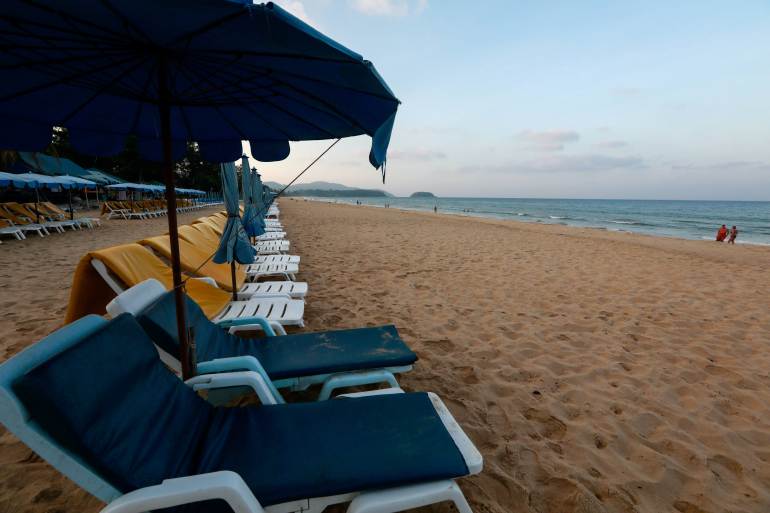To book or not to book? Fares edge up as US travellers make plans
Experts who track travel deals and consumer interest say demand for plane seats is likely to increase, driving prices back up.

The cost of travel will slowly rebound from historic lows as more people receive COVID-19 vaccinations and book long-deferred trips, according to industry experts.
This time last year, air traffic in the United States plummeted, with 95 percent fewer travellers passing through Transportation Security Administration checkpoints in April 2020 compared with April 2019. This reduced demand led to a corresponding decrease in airfare prices.
Keep reading
list of 4 itemsUS aviation and travel groups urge Biden to help boost travel
Fears of new COVID variants lead to lengthier travel quarantines
Canada to ask air travellers to wait on COVID tests in hotels
The average cost of a domestic round-trip ticket in the second quarter of 2020 dropped 28 percent from the same period in 2019, down to $259, according to the Bureau of Transportation Statistics. Few travellers were monitoring these prices at the time since so few were booking flights. But now, with COVID-19 vaccinations opening the possibility of travel to millions more Americans each week, prices are once again set to change.
If you’re one of those would-be travellers, experts cautiously advise booking your travel soon. Much remains uncertain, but prices are unlikely to return to 2020 levels.
Flight demand set to take off
Experts who track travel deals and consumer interest say demand for plane seats is likely to increase, driving prices back up.
Domestic airfare prices are expected to rise 4 percent to 5 percent every month until summer 2021, said Adit Damodaran, an economist with Hopper, a travel search tool. “A lot of that is based on the vaccination roll-out,” he said.
And this increased demand might combine with decreased supply. Airlines scaled back routes and flight frequency in 2020, parking aircraft and furloughing staff. They may be slow to return capacity to pre-pandemic levels, even as bookings pick up steam.
“Airlines are burning so much cash, so what we’re seeing is that they’re slowly expanding supply,” said Jesse Neugarten, who founded the flight-deal newsletter Dollar Flight Club. “If we have to shut down travel again, they don’t want to get caught in a similar situation as they did in 2020.”
Hotel prices may rise slowly
Hotel prices have also dropped during the coronavirus pandemic, though not as uniformly. Room rates in February in New York City were down 37 percent year-over-year, according to Hopper’s data, while small-town hotels saw only a 5 percent dip. This reflects a larger exodus from crowded cities during the pandemic. This pattern could reverse as vaccinated travellers flock back into metropolitan areas later in 2021, driving prices up.

But tourism accounts for only part of travel demand. Business travel, which has all but ceased during the pandemic, will likely be slower to return. This could keep hotel prices low throughout 2021, especially in large cities. It could also suppress airfare prices somewhat, even as more tourists take to the skies.
Booking flexibility likely to continue
Neugarten, who tracks flight deals, points to a changing travel landscape that extends beyond considerations of supply and demand. The pandemic changed how airlines and hotels handle flexibility, with many eliminating change and cancellation fees altogether. This, in turn, has changed the logic for how and when to book travel.
“I’m not going to book last minute because I can get a good deal if I’m booking three months in advance,” Neugarten said. “There’s a lot of incentive to book a deal now because of the flexibility.”
Furthermore, the travel trends that mark a typical year remain in flux. Memorial Day and July Fourth travel could follow unusual trends, especially in terms of when bookings will occur.

“The traditional events of the year in travel are simply not happening, so there isn’t the same ‘best time to book’ that we would normally see,” said Mark Crossey, travel expert for Skyscanner, a flight search tool.
And then there is the question of international travel. Many countries have a limited number of tourists, particularly from the US, and these restrictions may remain even as more travellers receive vaccinations.
“We’re not expecting an increase in prices for international airfare until May,” said Damodaran. And changing prices are unlikely to be geographically uniform, as countries update their policies one by one. Damodaran noted that Hopper is seeing the strongest interest in Caribbean and Latin American destinations.
Uncertainties abound. Vaccine distribution hiccups could dampen prices, as could surges in COVID-19 variants. Flexible booking options, although good for customers, could lead to mass rebookings later in the year. And volatile oil markets could impact airfare prices, as they do in normal years.
Despite these unknowns, experts remain cautiously confident that those looking to book 2021 travel should do so sooner rather than later. Greater flexibility reduces the risk of changing plans, and increased travel demand is unlikely to drive prices below current levels.
“I booked a one-way [flight] to Portugal in July for $109,” Neugarten says. “We’ll see if I get the vaccination before. If not, I’ll push it out.”